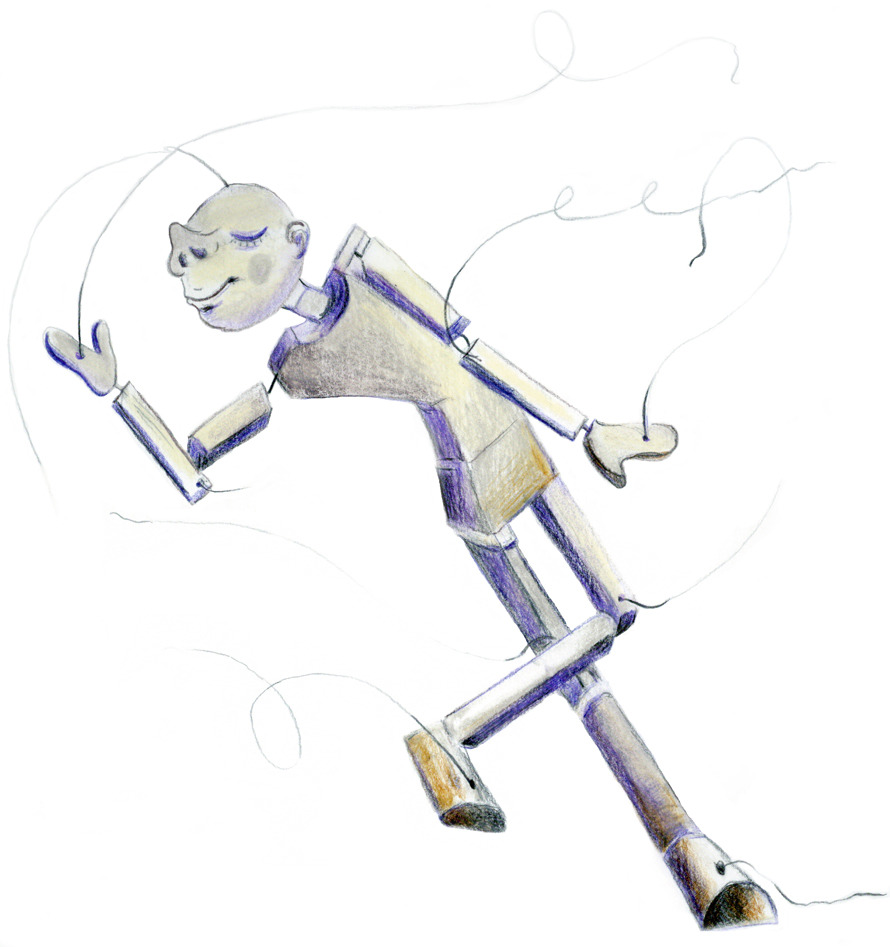“WHO pulls the strings?” the little puppet asked. The voice wasn’t his.
“Strings,” his mother repeated to the doctor, shaking her head. “Always it’s strings.”
The doctor revolved his big wooden thumbs. The pen in his wooden fingers wrote a prescription. “One tablet night and morning,” the doctor’s voice sounded. “You’ll feel better, my boy, and the strings will go away.”
But the little puppet felt no different, and the strings fell like rain. He had the unlucky ability to see them. He watched them open and shut the schoolteacher’s mouth when she complained:
“Stop talking about strings. You’re disturbing the class.”
The little puppet met Annette, the most adorable puppet he’d ever laid eyes on, with limbs like rippling water and a smile that turned his insides to jelly. He fell hook line and sinker in love. But Annette’s father took him aside.
“A funny fellow you may be,” he said, “with all this silly talk.” Then, bending down on spindly legs to the little puppet’s ear: “Take my advice, young puppet. Finish school and find a good job. You won’t get anywhere in the world talking about strings.”
“But we are puppets,” the little puppet said.
“Which is why we don’t mention strings,” Annette’s father said, straightening up to his full height. He had a big variety of gestures. “It is offensive, depressing and crude. Away, young puppet, and trouble my daughter no more.”
The puppet’s mother cried. She touched a square of cotton cloth to her cheek. “Don’t you understand, son? Everyone thinks you’re a freak.”
His heart broke. His legs carried him far from home. The audience saw the question painted across his back: Who pulls the strings? He felt it burning like hot sun. The question had cost everything. It had cost him Annette. Wherever he went it sprang to his lips unbidden. It wasn’t him that spoke. The question broke open his mouth and blurted. It made him seem strange. Nobody liked him. Maybe he was mad.
He took violin lessons, but the question rasped like sand in the notes. He learnt to draw, but the question smudged the page. He went to dance classes, but only stumbled and fell.
“Who pulls the strings?”
Wise and learned puppets discussed the possible existence of strings. A floating priest puppet dressed in black cardboard said they were a test from God: “I will pray for you, my son.”
“Forget, little puppet,” the beautiful Contessa Rosa advised. “What a waste for one so young and handsome to be in love with sadness. Forget, and lie in my soft arms.”
The puppet met an old arthritic hermit. “I’m so unhappy,” the puppet told him. “I don’t have a friend in the world.”
“Haven’t you?” the hermit puppet asked, and even his smile creaked. “Haven’t you a friend: one who stays faithful, who never lets you down?”
“I don’t think so,” the puppet said.
“There is one,” the hermit said, “who comes to life when we come to life, who takes our first steps, opens our eyelids in the morning, closes them at night. Without that friend, little puppet, we are nothing.” The hermit placed a trembling hand knotted with pain on the puppet’s shoulder. “Who pulls the strings?” the old puppet whispered. “Ask and don’t stop till you find out.”
So the little puppet asked the question day and night. He questioned each movement, joint, finger and toe. He asked in his sleep and dreams. The question coated every smell and taste. Its longing imbued the scrape of his fiddle bow. Its black despair spilt over his drawings. When he danced its absurd jive everybody booed.
Finally the puppet fell in a tangled heap. Glass tears stained his cheeks. He was the world’s fool. He heard a gasp. It came from the audience, who were seeing the question written on the puppet’s back suddenly come to life as a puppet in its own right. The look-alike double ran up and down the stage, thumbing its nose at the little puppet.
The little puppet couldn’t tell what he was thinking. His thoughts were not his own. To end the play, he had to pick himself up, come forward, and hold out his inmost self to the audience. Through a dazzle of tears, he untangled his strings and separated each shining strand. He got up and came forward, grasping the strings in his puppet fists. He had no words. He was a puppet, after all. The voice the audience heard was never his. The strings — the invisible strings that moved his puppet limbs, beat his puppet heart, worked his puppet thoughts, the same strings moved Annette’s effortless limbs, beat her heart, dreamed her dreams — not only Annette: these were the animating filaments of the farthest star.
Who pulls them? The final trick of the play was dropping the curtain to reveal no one there. Then all the puppets took a bow. The little puppet got the biggest round of applause.

